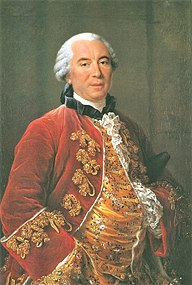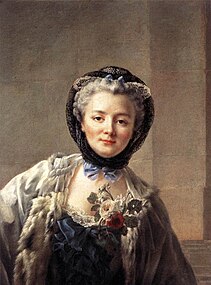François-Hubert Drouais: Difference between revisions
Cannegan21 (talk | contribs) No edit summary |
Cannegan21 (talk | contribs) No edit summary |
||
| Line 14: | Line 14: | ||
File:PompadourDrouais.jpg|''Portrait of [[Madame de Pompadour]] (1721-1764)'' |
File:PompadourDrouais.jpg|''Portrait of [[Madame de Pompadour]] (1721-1764)'' |
||
File:Madame Drouais.jpg|''Madame Drouais (1758) [[Musée du Louvre]], [[Paris]]'' |
File:Madame Drouais.jpg|''Madame Drouais (1758) [[Musée du Louvre]], [[Paris]]'' |
||
File:''Portrait of Three Children''.jpg| |
|||
<gallery> |
<gallery> |
||
Example.jpg|Caption1 |
Example.jpg|Caption1 |
||
Revision as of 05:27, 22 November 2018
François-Hubert Drouais (Paris, 14 December 1727–Paris, 21 October 1775) was a leading French portrait painter during the latter years of Louis XV's reign.[1] His clientele included the French royal family and nobility, foreign aristocracy, fermiers-généraux (tax farmers), and the wealthier members of Parisian society and their favourites. But it was his increasing popularity at the French court that expanded his clientele and made his portraits a fashionable necessity. Drouais’s work was admired during his lifetime, and his popularity and clientele did not diminish from the occasional adverse judgement published in Salon reviews.
Drouais was apprenticed successively to his father Hubert Drouais, Donat Nonnotte, Charles-André van Loo, Charles-Joseph Natoire, and François Boucher. He was received into the Académie royale in 1758 with his morceaux des réception portraits of the celebrated sculptors Edme Bouchardon (1698–1762) and Guillaume II Coustou (1716–77). Both portraits were exhibited at the Salon of 1759 and received praise. Drouais attended the meetings of the Académie royale and, from 1755 until his death in 1775, exhibited regularly at the official Salons held in the Louvre in Paris.
Drouais was a favourite portrait painter of Jeanne Beçu, comtesse du Barry (1743–93) and, from 1772 until his death, held the position of premier peintre to Louis-Stanislas-Xavier, comte de Provence (1755–1824), known as Monsieur, later Louis XVIII. Mesdames de France, the daughters of Louis XV, were also important patrons. They recommended him to their father, Louis XV, when a portraitist was sought to travel to Vienna to paint the young Marie-Antoinette. Drouais was approached, but his commission fee was regarded as too high. Ducreux went instead.
Some of Drouais's pupils include Catherine Lusurier, his son Jean-Germain Drouais, Jean-Louis Voille, and Pierre-Hippolyte Lemoyne.
Among his portraits include those of Louis XV, Louis's official mistresses Madame de Pompadour and Madame du Barry, Mesdames de France, the comte and comtesse de Provence, the comte de Buffon, Madame Favart, and the young Marie-Antoinette.
-
Portrait de Buffon (1707-1788)
-
Portrait of Madame de Pompadour (1721-1764)
-
Madame Drouais (1758) Musée du Louvre, Paris
-
Caption1
-
Caption2
File:Monsieur Denis-Paul le Pot de la Fontaine François-Hubert Drouais.JPG|Monsieur Denis-Paul le Pot de la Fontaine(?), 1772, oil on canvas, The Detroit Institute of Arts File:Signature of Francois Hubert Drouais (1756).jpg|His signature in "Family Portrait" in the collection of the National Gallery of Art </gallery>
References
- ^ For a history of the Drouais family, see Prosper Dorbec (1904, 1905) and Camille Gabillot (1905,1906). For an analysis of Drouais's oeuvre, see Catherine Egan 2016 http://hdl.handle.net/1959.9/562512
External links
 Media related to François-Hubert Drouais at Wikimedia Commons
Media related to François-Hubert Drouais at Wikimedia Commons





